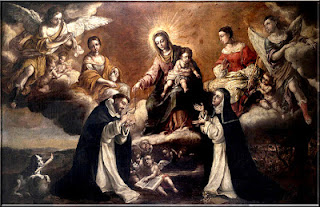The Rosary 1
The hermits of the first centuries, who could not read the psalter, used to recite one Our Father and one Hail Mary in the place of every psalm; and in order to note the number they said, they made use of small stones, or of seeds strung on a cord. St. Dominic was the first who made the custom general of substituting one hundred and fifty Hail Marys for the one hundred and fifty psalms; hence the rosary used to be called the Psalter of Mary.
When, about the year 1200, the heresies of the Albigenseans wrought great mischief in the south of France and the north of Italy, St. Dominic was commissioned by the Pope to preach in refutation of their erroneous tenets. His efforts availed little, and he besought the aid of the Mother of God. She appeared to him, and bade him make use of the rosary as a weapon against her enemies. He accordingly introduced it everywhere, and before long it had effected the conversion of more than a hundred thousand heretics. The use of the Rosary soon spread throughout Christendom, and it became a most popular devotion. It is a method of prayer at once simple and sublime; the prayers are so easy that a child can repeat them, and the mysteries are so profound that they supply a subject for meditation to the most learned theologians. It is a prayer of contemplation as well as a prayer of supplication, for it places before the mind the principal truths of the faith. The Rosary is a compendium of the Gospels; a complete and practical manual of instruction wherein the chief points of Christian doctrine are presented under the guise of prayer. By meditation on the events of Our Lord's life faith and charity are increased; from the example of our divine Redeemer we learn to be humble, gentle, obedient; we are incited to imitate the virtues which the mysteries teach, to strive after what they promise us. Moreover the union of vocal and mental prayer makes the Rosary easy, pleasant, and profitable. As a method of prayer it is unrivaled; the longer and more devoutly it is practiced, the more one appreciates its excellence and becomes convinced of its supernatural origin
When, about the year 1200, the heresies of the Albigenseans wrought great mischief in the south of France and the north of Italy, St. Dominic was commissioned by the Pope to preach in refutation of their erroneous tenets. His efforts availed little, and he besought the aid of the Mother of God. She appeared to him, and bade him make use of the rosary as a weapon against her enemies. He accordingly introduced it everywhere, and before long it had effected the conversion of more than a hundred thousand heretics. The use of the Rosary soon spread throughout Christendom, and it became a most popular devotion. It is a method of prayer at once simple and sublime; the prayers are so easy that a child can repeat them, and the mysteries are so profound that they supply a subject for meditation to the most learned theologians. It is a prayer of contemplation as well as a prayer of supplication, for it places before the mind the principal truths of the faith. The Rosary is a compendium of the Gospels; a complete and practical manual of instruction wherein the chief points of Christian doctrine are presented under the guise of prayer. By meditation on the events of Our Lord's life faith and charity are increased; from the example of our divine Redeemer we learn to be humble, gentle, obedient; we are incited to imitate the virtues which the mysteries teach, to strive after what they promise us. Moreover the union of vocal and mental prayer makes the Rosary easy, pleasant, and profitable. As a method of prayer it is unrivaled; the longer and more devoutly it is practiced, the more one appreciates its excellence and becomes convinced of its supernatural origin


Comments
Post a Comment